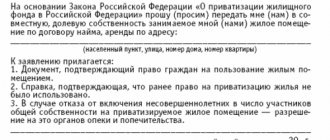Home » Housing disputes » The procedure for forced eviction from an apartment by court decision
12
The court decided to evict a citizen from the living space he occupied; the situation is not as rare as we would like. But the tenant does not want to comply with the court decision and move out, the reasons may be different: he has nowhere to move, he has not yet found another apartment, he has other plans - there can be many reasons not to comply with the court decision. What should the owner do in such cases? Contact the bailiff service to forcibly evict the tenant.
What is forced eviction
Forced eviction is the forceful expulsion from living quarters of citizens who are obliged to leave the apartment by a court decision. Also, during a forced eviction, a residential property must be cleared of personal belongings, furniture, household appliances, and pets of the person being evicted. This procedure is carried out by employees of the bailiff service.
But just like that, at the personal request of the owner of a residential premises, the bailiffs cannot forcibly evict anyone; there must be a basis for the expulsion of citizens. Such a basis is the writ of execution issued by the judicial authorities based on the results of court hearings and the decision of the senior bailiff to initiate enforcement proceedings.
Forced eviction is possible only by court decision. No authority, no law enforcement agency has the right to force eviction without a court decision that has entered into force.
There are several features of forced eviction that you need to know about so as not to break the law yourself, and, if you are evicted, to be able to protect your rights in case of their violation:
- If the eviction occurs for reasons beyond the control of the tenant, then he must be provided with alternative housing equivalent to the one from which he is being evicted.
- When evicting their municipal housing for debts on utility services, local governments are obliged to provide the tenant with alternative residential premises of a smaller area and, possibly, less comfortable. At the same time, the utility debt remains.
- If the owner of an apartment is evicted, then his property is sold at auction, the proceeds go to pay off all debts and legal costs, the remaining amount is transferred to the former owner. Often the funds remaining after paying off all debts are enough to buy another apartment, of course, a much smaller one.
- The bailiff does not have the right to carry out forced eviction on his own. During the procedure, two disinterested witnesses, the owner of the residential premises, and a representative of law enforcement must be present. In some cases, when bailiffs cannot get into a residential premises, employees of the Ministry of Emergency Situations are involved. The latter opens the apartment, providing access to it for all participants in the forced eviction.
- The absence of the person being evicted cannot be an obstacle to the procedure for expelling him from the occupied premises. All personal belongings are described and placed in safe custody. The evicted person is notified in writing of the location of his belongings and the date by which he must pick them up.
Court decisions
My housing: what to do if they try to kick you out of your apartment
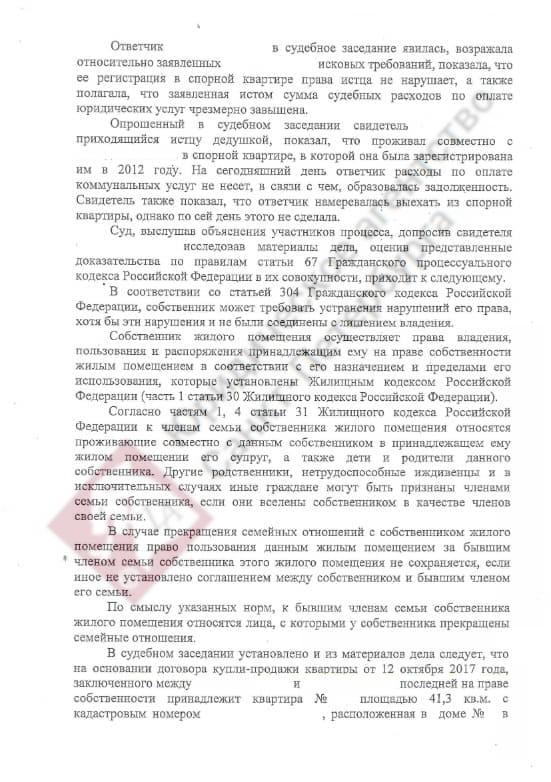
Unwanted neighbor: how to defend your rights to an apartment?
On your own rake: what nuances should not be forgotten when it comes to the housing issue
How to peacefully resolve housing issues
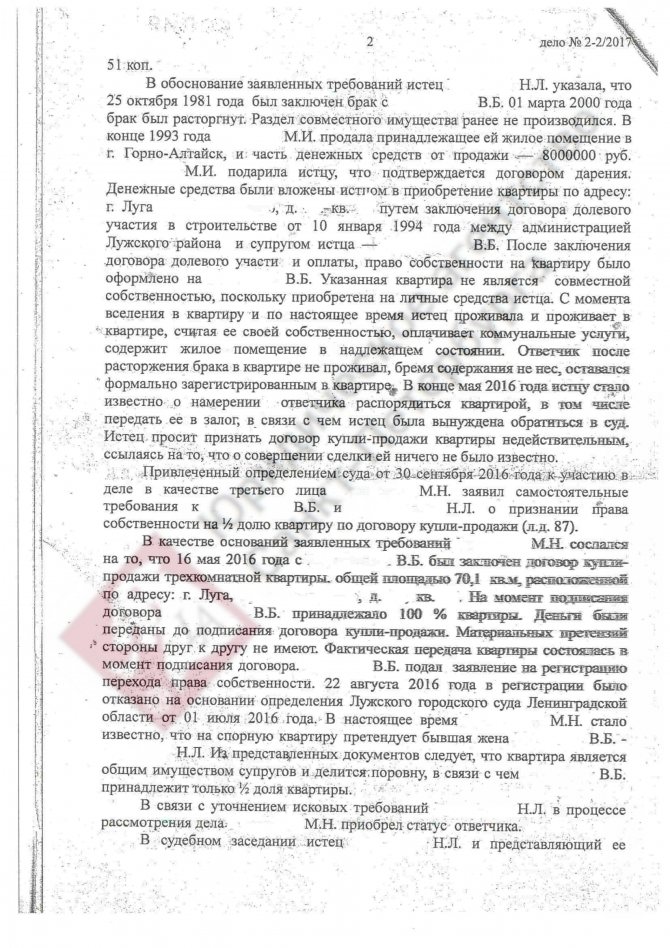
How to protect property rights after divorce
The apartment does not meet sanitary requirements
Grounds for eviction from an apartment
The main grounds for eviction from a residential premises by a court decision are considered to be malicious violations of the rules of living in a residential premises or the loss of the tenant’s right to use the apartment.
For example, citizen K. lived in the apartment of his wife, who is the owner of the residential premises. After the divorce, he lost the right to reside in this residential premises, as he ceased to be a member of the owner’s family. If he does not leave the apartment voluntarily, she has the right to file a claim to evict her ex-spouse and, subsequently, after the court decision enters into force, to apply to the SSP for help in forced eviction.
So, the reasons why eviction may occur without the provision of alternative housing:
- divorce of spouses, if only one of them is the owner of the residential premises;
- deprivation of parental rights;
- violation of the structure of the property, if it threatens the destruction of the building or a significant reduction in its strength;
- malicious violation of the rights and interests of neighbors (noise at night, rows, creation of a drug den, etc.);
- inappropriate use of a property (operation as a warehouse, store, workshop).
In some cases, eviction is possible only with the provision of alternative housing, this is possible on the basis of:
- eviction from a municipal apartment for long-term (more than six months) non-payment of utility bills;
- resettlement in connection with the alienation of land under a building or in connection with the transfer of a residential property to non-residential;
- eviction due to recognition of the property as unsafe.
Most often, forced eviction occurs during resettlement according to the first list, but sometimes citizens do not want, for some reason, to leave their old apartment for new housing, even if the alternative living space is more comfortable, and the old house is in disrepair. In such cases, the assistance of SSP employees will also be required.
Customer Reviews
Gratitude from P.V. Greshina I would like to express my deep gratitude to the employees of your company - Sergei Vyacheslavovich Mavrichev and Konstantin Vasilyevich Solovyov for their enormous support, for their competent explanation and good attitude towards people. I wish you success and prosperity.
Greshina P.V. 03/23/2018
Gratitude from N.A. Tomashpolskaya I would like to express my deep gratitude to Alexander Viktorovich Pavlyuchenko for his competent legal advice and sensitive, attentive attitude towards me, who found myself in a difficult situation.
Sincerely, Tomashpolskaya N.A. 07/01/18
Gratitude from Plisetsky V.V. I would like to express my gratitude to Sergei Vyacheslavovich Mavrichev for his sensitive attitude and understanding towards clients. The issue was resolved within one day. I am very grateful to Sergei Vyacheslavovich.
Plisetsky V.V. October 19, 2018
Gratitude from Truk N.N. I would like to express my gratitude to Vasily Anatolyevich Kavalyauskus, Alexander Viktorovich Pavlyuchenko and Maxim Andreevich Lobur for providing qualified legal assistance, with the help of which my problem was resolved quickly and clearly. When contacted, I always found understanding and attention. It’s good that the “Society for the Protection of Consumer Rights” employs such lawyers and advocates. I wish you success in your future work and defending the interests of consumers.
Sincerely, Truk N.N.
07.05.2018
Gratitude from Bolotin V.S. I thank Alexander Viktorovich Pavlyuchenko for the work done as part of the investigation into the administrative case. I am especially grateful that almost all activities within the framework of the case were carried out by Alexander personally, without my involvement, which significantly saved my time. I would also like to note the efficiency with which the work was completed. I would like to wish Alexander further success in his professional activities and the successful completion of all current and subsequent cases, restoring justice to his clients.
Bolotin V.S., 02/12/2017
Thanks from Radhuan M.R. Dear Kavaliauskas Vasily Anatolievich. Let me express my sincere gratitude for the qualified legal assistance provided. Thanks to your professionalism, I was able to achieve a decision in my favor. I wish you further prosperity and professionalism.
Radhuan M.R. 06/08/2018
Gratitude from Kikkas V.P. Kikkas V.P. I am grateful to the Legal Agency of St. Petersburg for understanding the situation and timely assistance in my seemingly hopeless situation, personally to Denis Yuryevich Stepanov, I hope to continue to cooperate.
Kikkas V.P. 08.11.2018
Gratitude to Sukhovarov I, Dmitry Vladimirovich Korchagin, express my gratitude and appreciation to lawyer Yuri Vladimirovich Sukhovarov for high-quality and qualified advice. Thank you.
Gratitude from Loseva S.I. I express my deep gratitude to Sergei Vyacheslavovich (lawyer of the firm) for his very clear, accessible help in solving my problem (protecting rights as a consumer). This is the second time I have contacted you to solve my problems. Always everything......and in full.
With gratitude, Svetlana Ivanovna Loseva, 02/15/2019
Gratitude from Vraveevsky S.A. Sergey Vyacheslavovich! Thank you very much for the consultation! All the details were disclosed to me in detail, all questions were answered comprehensively. I am very glad to receive help from a qualified specialist!
Vraveevsky S.A. 12/18/2018
Procedure for eviction from an apartment by court decision
After receiving a court decision on eviction that has entered into force, the defendant is obliged to leave the residential premises before the period specified in the document. If he does not want to leave, then the plaintiff must contact the SSP, having in his hands a writ of execution and a court decision that has entered into force. Next, the SSP employees get down to business.
How does the forced eviction process work?
- The bailiff service receives a writ of execution.
- A senior bailiff studies documents and prepares for forced eviction.
- Enforcement proceedings are initiated.
- The applicant and the defendant are notified of the commencement of enforcement proceedings.
- The evicted citizen is given a period of time to comply with the court decision on a voluntary basis.
- If voluntary eviction does not occur within the specified period, the SSP employee, together with the owner of the residential premises, the district police officer, and two witnesses, enters the residential premises and carries out a forced eviction.
The forced eviction process consists of the following steps:
- The SSP employee draws up an eviction act, which must be signed by the bailiff himself, the evicted tenant and two witnesses.
- The bailiff must introduce himself to the evicted citizen, show his identification and read out to the latter his rights and responsibilities during the procedure. If this rule was ignored, the defendant has the right to appeal the actions of the SSP employee.
- An inventory is made of all the property that is located in the residential premises at the time of the procedural actions, and the document is divided into two lists: the property of the owner (if any) and the belongings of the defendant.
- If necessary, all property of the evicted person is sent for safekeeping. The address where things will be stored is communicated to the defendant.
- After completing the procedure, the police officer seals the door, or the keys to the residential premises are handed over to the owner of the apartment.
- The final stage of the procedure is the issuance of a resolution on the completion of enforcement proceedings and the transfer of the document to the court office.
The entire procedure must take place in full compliance with the law. If the evicted citizen behaves calmly and does not show any aggression towards the participants in the process, it is prohibited to use physical force against him.
Eviction act
The eviction act is drawn up in the presence of the owner of the residential premises, two witnesses (attesting witnesses), and the defendant. If the person being evicted is absent at the time of the procedure, the law allows for actions to expel the offender without his participation.
The following information is required to be filled out in the eviction certificate:
- Name;
- position and full name of the SSP employee conducting this procedure;
- information about all participants in the procedure, and if the defendant is absent at the time of eviction, a special note is made in the act;
- enforcement case number;
- a description of all the defendant’s property that must be removed from the residential premises;
- if necessary, comments or additions from all participants in the procedure;
- date of document preparation;
- signatures.
Deadline for eviction
As a rule, two months are given to implement a court decision. Another period may be established by an executive document. In this case, the participants in the process are notified of the circumstance under consideration.
Deprivation of housing is a painful process. Bailiffs often face great difficulty and resistance in carrying out their duties. The materials in this article will help you understand the procedure and the powers of government officials in order to use them to protect your interests.
Time limit for eviction from an apartment by court decision
The law states that after receiving notice of the commencement of enforcement proceedings, the defendant has five days to voluntarily leave the premises. After this period, if the defendant has not yet moved out, the bailiff extends the eviction period for a few more days, but in this case the evicted citizen is required to pay an enforcement fee.
At the end of the second (additional) period for voluntary eviction, a procedure for the forced eviction of the offender is launched.
There are force majeure situations when, for some reason, the bailiff is not able to evict the defendant to his new place of residence, for example, the alternative residential premises are unsuitable for habitation. In this case, the enforcement proceedings are suspended, the SSP employee notifies the court about the impossibility of evicting the defendant, indicating the reason, and requests a postponement of the execution of the court decision, or a change in the eviction procedure by the court.
In this case, the court may change the eviction procedure and oblige the plaintiff to pay monetary compensation to the defendant instead of providing alternative residential premises, or require the plaintiff to provide other residential premises similar to those specified in the writ of execution.
Can they provide a deferment?
Situations often occur when the defendant would like to execute a court decision voluntarily, but cannot immediately do so due to some circumstances. In this case, the defendant has the right to file a motion to postpone the eviction, with the obligatory indication of the reason for the inability to move out immediately. If the court considers these reasons to be valid, the defendant will receive a deferment on the eviction.
Sample application for deferment of execution of a court decision
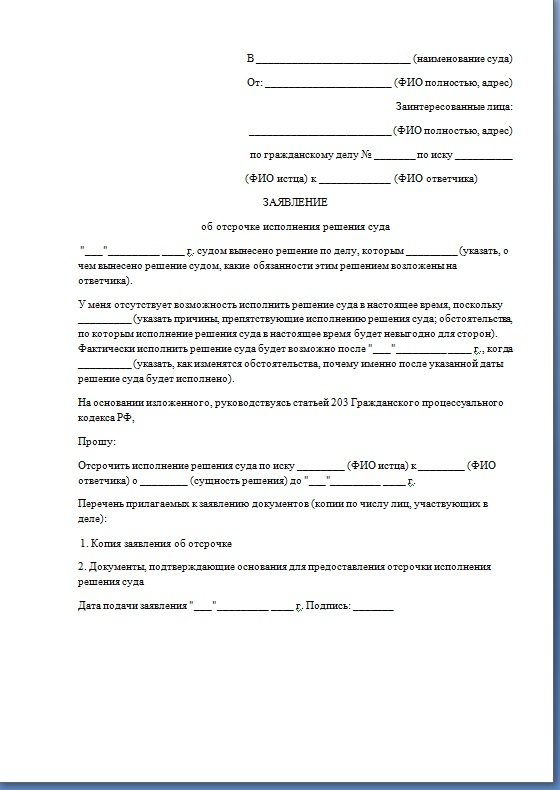
Situations in which the court may grant a deferment:
- serious financial difficulties;
- the presence of minor children in the family, in this case a deferment can be granted until adulthood;
- serious disease.
The court will also grant a deferment followed by cancellation of the court decision if the evicted person:
- completely repaid the housing and communal services debt;
- compensated the neighbors for the damage he caused;
- got rid of drug or alcohol addiction;
- eliminated illegal redevelopment or legalized it,
in other words, if the defendant has completely eliminated all violations that were the basis for his eviction.
The practice of forced evictions
Bailiffs act strictly within the framework of enforcement proceedings. What kind of forced eviction will be will largely depend on the behavior of the defendant at the time of execution of the court decision. Let's look at eviction options using specific examples.
Example 1 . Citizen Solovyov lived in a two-room apartment with his wife and two minor children. He often abused alcohol, during heavy libations he started brawls, and often beat his wife. She endured it for a long time, but when her husband beat her youngest son, after which he ended up in a hospital, the wife could not stand it and turned to the guardianship and trusteeship authorities.
OOP officers visited the boy in the hospital, interviewed neighbors, and then filed a lawsuit to deprive the father of parental rights and subsequently remove the father from the living quarters. The court satisfied the plaintiff's claims.
But Solovyov did not even think about moving out of the apartment, he not only continued to be there, but continued to drink and raised his hand again, this time against his eldest son. The PLO handed over the writ of execution to the bailiff service, enforcement proceedings were opened, and the SSP officer notified the defendant of the need to leave the premises within five days. But the defendant categorically refused to leave.
At the end of the five-day period given to Solovyov, in the presence of two witnesses and police officers, the bailiff tried to forcibly evict the defendant, but the latter barricaded himself in one of the rooms and refused to leave the apartment. When the called Ministry of Emergency Situations officers entered the room closed by Solovyov through the window, he attacked them, threatening them with a knife. The police officers arrived in time and were able to stop the defendant’s attack and detained the latter. The forced eviction procedure was completed.
Subsequently, a criminal case was opened into an attack on Emergencies Ministry employees while on duty. Soloviev received a real sentence.
If the defendant had not behaved so aggressively, the unfortunate consequences could have been avoided. His wife was not even against Solovyov communicating with his sons, provided that he was in a normal state at the time of visits with the children, since the boys continued to love their father and did not want to completely give up communication with him.
Example 2 . Shevelev, an employee of a company producing window blocks, lived in a service apartment under a service lease agreement. The contract was signed for five years; upon expiration of the document, the head of the enterprise did not renew the employment contract with Shevelev and notified the latter that he must leave the company apartment, as he had lost the right to live in it. But Shevelev refused to move out, because he believed that his dismissal was illegal.
A claim was filed to evict the defendant from the official residential premises. The court granted the plaintiff's claims, but the defendant was still in no hurry to leave the apartment.
The plaintiff handed over the writ of execution to the SSP; enforcement proceedings were opened, on the basis of which the SSP employee notified the intractable tenant of the need to leave the apartment he occupied within five days and of the consequences of failure to comply with the court’s demands.
Shevelev consulted with a lawyer and realized that if he did not comply with the court decision and did not move out of the premises on his own, he would still be evicted, but he would additionally have to pay an enforcement fee. The defendant left the service apartment voluntarily.
In this situation, the defendant did the right thing. The eviction would still have taken place, but it would have been forced, the consequences would have been more serious.
Eviction from an occupied living space in itself is an unpleasant event, especially forced eviction, when law enforcement agencies, witnesses, and other participants in the process are involved in the procedure. It is quite possible to avoid such a situation if you try not to bring the conflict to court, and if the court has decided to evict and no appeals have helped, all you have to do is come to terms with it and not aggravate the situation.
FREE CONSULTATIONS are available for you! If you want to solve exactly your problem, then
:
- describe your situation to a lawyer in an online chat;
- write a question in the form below;
- call Moscow and Moscow region
- call St. Petersburg and region
Save or share the link on social networks
(
1 ratings, average: 5.00 out of 5)
Author of the article
Natalya Fomicheva
Website expert lawyer. 10 years of experience. Inheritance matters. Family disputes. Housing and land law.
Ask a question Author's rating
Articles written
513
- FREE for a lawyer!
Write your question, our lawyer will prepare an answer for FREE and call you back in 5 minutes.
By submitting data you agree to the Consent to PD processing, PD Processing Policy and User Agreement
Useful information on the topic
5
Statement of claim for eviction from an apartment
There can be many reasons for eviction. A careless tenant who in no way...

2
How to evict your roommate from your apartment
Neither legal nor civil marriages provide guarantees of long and...
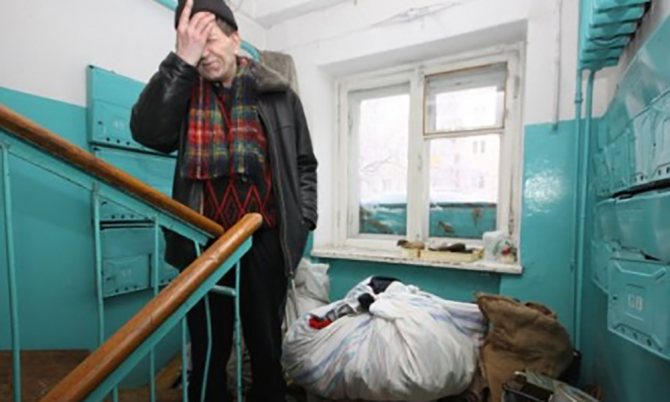
3
Is it possible to evict tenants in winter?
Renting out an empty apartment is quite a profitable business, especially...

1
Privatization of land under an apartment building
You can privatize not only a separate residential building, apartment or land...

Privatization of an apartment through the MFC
Privatization of an apartment is a complex and lengthy process, but for many...

4
How much does it cost to privatize an apartment?
Privatization of an apartment is a free procedure, but only within the cost...




